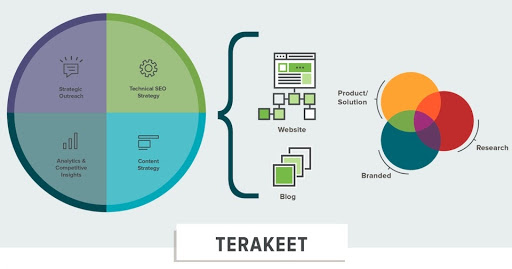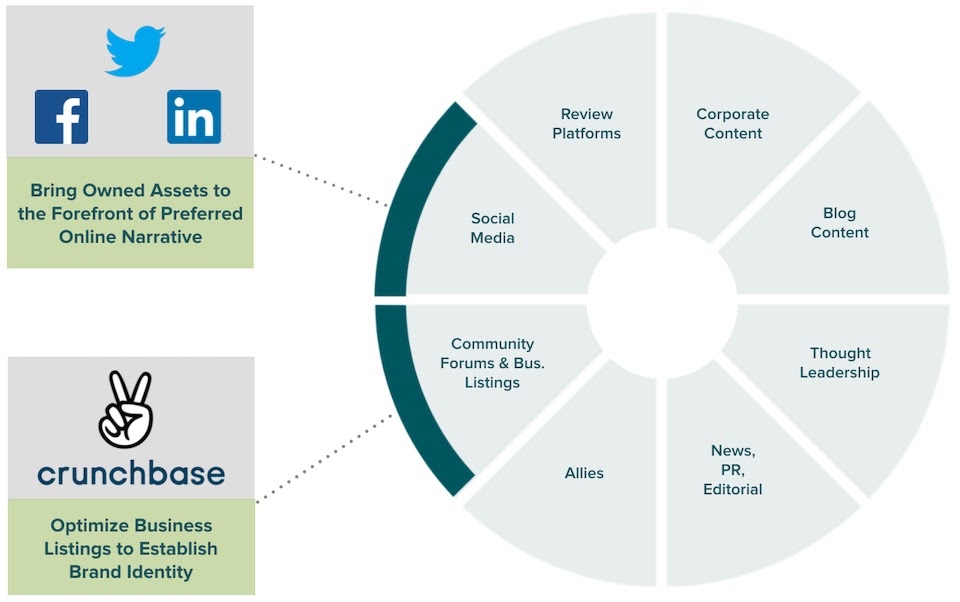Smaller startups and disruptor brands are 100% focused on revenue: “What is the amount of revenue I can tie directly to non-branded keyword movements?”.
For enterprise brands, it’s all about owning more market share than their competitors do.
Hi Ron! Can you tell us a little about yourself?
My name is Ron Cierniakoski and I am the Operations Manager at Terakeet (opens in a new tab). We are experts in organic search optimization that leverage proprietary technologies to build and execute SEO strategies that help Fortune 1000 brands dominate their search landscape.
As an operations manager, I work with our teams to find ways to improve the work we are performing on behalf of our customers. I also support the development of SEO strategies that help our customers achieve impactful results. Prior to my role in operations, I was the Director of Analytics where I developed new and innovative ways to leverage data to define areas of opportunity and report on our success.
What do you consider enterprise SEO?
The term “enterprise SEO” is often used incorrectly to describe search engine optimization for large websites. At Terakeet, we define enterprise SEO as a search-driven business strategy. It’s more of a business partnership than a vendor relationship. Only when SEO is built into multiple departments and hierarchies of a business is it truly enterprise-level.

How is enterprise SEO different from “regular” SEO?
Enterprise SEO has a much broader impact on top-line business performance than traditional SEO which tends to focus on the valuable, but simple, goal of “getting more traffic”.
For example, enterprise SEO improves the effectiveness of public relations, targets brand comparison searches, and helps to fortify a brand’s (or CEO’s) online reputation. Even the metrics and reporting go beyond rankings and traffic to encompass CAC, market share and brand sentiment.

What do you love most about doing enterprise SEO?
I love the amount of data that’s available to us. I got my start in SEO through analytics, so using data in different ways will always be interesting to me. Because Terakeet’s customers are massive enterprise companies, we have access to huge amounts of data that you just can’t get when working with SMBs.
Analyzing this data has shaped Terakeet’s understanding of how search works. We continuously seek to interpret what Google is trying to do in their SERPs and how that translates through the algorithm.
So whether I’m leveraging the search engine to find new keywords variants, organizing competitors’ linking data to quantify the authority gap, or measuring the impact of our tech and content recs, I love the story the big data of enterprise SEO tells. It has been a lot of fun to work in this space, and it’s been a great learning experience.
And, what do you hate most about doing enterprise SEO?
It can take a significant amount of time for customers to implement change. Larger companies often have more layers of approval leading to competing priorities which increases the time it takes to deploy recommendations that we provide.
You also need to be careful with how your message is being perceived. It’s very easy for people on a customer's team to feel like you are stepping on their toes or even that your interests are in conflict with theirs. To overcome these issues it’s really important to align your work with the goals of each layer of their organization. We see the most success when we get those teams involved early in our process. We set up in-person sessions where our team and their team work together to build out strategies, identify new opportunities for leveraging the site, and even identify opportunities where we can add some SEO support to the initiatives they are working through.
Spent ages getting your customer or dev team to implement your recommendations?
Verify it's done correctly, and make sure it's not accidentally reverted during future updates. Monitor their site 24/7!
How real are the struggles with getting recommendations implemented in enterprise SEO?
The struggles are real.
One thing that we’ve learned is how important it is to be a true partner. In other words, we can’t just hand over a list of technical site improvements and expect customers to complete them within a week. Each enterprise company has a different set of processes and priorities, so we need to figure out how these massive companies operate. Once we understand the bureaucracy, we can identify and leverage internal allies.
It’s not enough to only interact with our primary points of contact, we also need to build relationships with product managers, content managers, developers, and the executive team. When we understand the drivers and goals within our customers’ departments, it’s much easier to show them how working with us can expedite and amplify the outcomes they care most about.
In many cases, we need to guide our main point of contact through that bureaucracy. To help, we include clear steps within our action items that our POC needs to take to ensure that critical tasks are completed on schedule. For example, we may request a meeting with the product team or ask for insight into the customer’s next few sprints so we can align our recommendations with upcoming priorities. In other cases, we may need our POC to formally add a task to their internal project management system.
When it comes to educating client-side teams, we keep training focused on our methodology. In other words, how are we going to build their enterprise SEO strategy vs. training them on enterprise SEO itself.
We’re usually several steps removed from the person performing a task, so it’s critical that we understand what happens when we deliver recommendations to customers. Who needs to sign off? What questions will stakeholders have? The more information we can give customers up front, the faster our recommendations will be implemented.
Do enterprise companies still need to do link acquisition in order to be successful at SEO?
Link acquisition is an interesting topic in SEO. Too many brands implement unsustainable link practices that put all the focus on quantity or a single misunderstood metric like domain authority without considering the most important concept: why the link exists. So when that approach doesn’t deliver results, people tend to undervalue the impact that an effective linking strategy actually has.
I also wish we could call it something other than “link acquisition” because it misses the mark on the incredible amount of work that goes into earning high-impact citations. Although the link itself is the ultimate goal, as SEOs we should all be thinking about providing value to the readers. That means hard-to-measure metrics like relevance, context and intent are just as important as domain authority.
Enterprise customers definitely tend to have a lot more authority within their space, especially when compared to smaller brands that are trying to break in. So, in many cases, they don’t need broad linking strategies to focus on improving their authority. With enterprise brands, we try to be more surgical with how we implement a link acquisition campaign by focusing on adding just a little extra strength to the topics in order to fully own them in the SERPs. In many cases it can make the difference between ranking 3 or ranking 1 which has a dramatic impact on success metrics.
How important is the relationship with the PPC team within enterprise SEO, and how do you work together?
Paid and organic teams often exist in silos, and they tend to compete for a larger slice of the same marketing budget—and sometimes the same traffic. We’ve seen direct evidence of how shifts in paid spending behavior impact organic traffic. But siloing also extends to public relations teams and marketing teams. By strategically integrating an SEO partner within the broader marketing department, brands can improve efficiency across multiple marketing initiatives.
How important is training client-side teams in enterprise SEO, and what do you train them in?
This is an interesting question. My general philosophy is that when you are working with highly experienced marketers—regardless of whether they have a lot of SEO experience—if they don’t understand what you’re asking for, there’s probably something wrong with your deliverable. So at any point when we think there is a disconnect between what we’re pitching and how the customer is digesting it, we always ask ourselves “is there a way we could make ourselves better?”.
When it comes to educating client-side teams, we keep training focused on our methodology. In other words, how are we going to build their enterprise SEO strategy vs. training them on enterprise SEO itself. We show them how the relationship should work for us to maximize success:
- What are we responsible for?
- What are they responsible for?
- What are the non-negotiables?
Ultimately, we want our customers to trust that the information we present is coming out of deep analysis and expertise in SEO, and we want to limit the number of friction points that happen in our partnership.
What’s the most important thing you’ve learned about enterprise SEO so far?
How we measure our impact is very different.
Smaller startups and disruptor brands are 100% focused on revenue: “What is the amount of revenue I can tie directly to non-branded keyword movements?”.
For enterprise brands, it's all about owning more market share than their competitors do.
On the flip side, that has its own set of challenges. Mainly, in order for us to even be in the conversation we need to be able to point to seismic opportunities of impact. These sites are big, and in order to get them to even think about moving you need to show them that the opportunity is even bigger.



